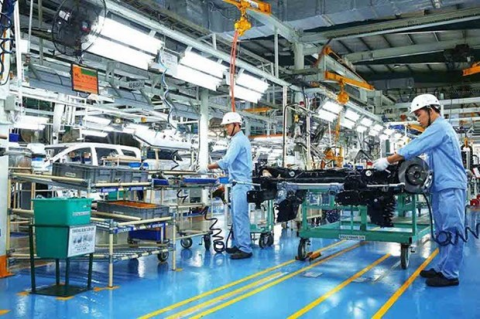Vietnam is ready for new conditions to attract FDI
Kinhtedothi – The global minimum tax that is being used has made it hard for Vietnam to keep its business environment competitive. In this situation, the Government needs to make new choices to make it easier for businesses to invest.
In order to get more FDI companies to invest in Vietnam, the government is working to make the country a better place to invest than other countries. In particular, Vietnam has put in place policies to exempt and lower corporate income tax (CIT) in order to make Vietnamese companies’ products more competitive on the world market.

Producing phone components at an FDI enterprise (Illustration photo)
Director of the Institute of Financial Strategy and Policy at the Ministry of Finance, Nguyen Nhu Quynh, said that Vietnam has changed the general business income tax rate from 32% to 28%, 25%, 22%, and now 20%, while also applying many preferential policies.
For businesses that can get both tax rate and time-based benefits, the real tax rate is 15% lower. Because of this, Vietnam has become a good place for foreign businessmen to put their money. From 2017 to 2022, Vietnam will have gotten close to $200 billion (USD).
But Mr. Quynh says that FDI businesses will no longer be able to use Vietnam’s strategy of tax exemptions and reductions because the global minimum tax is now in place. It also makes it harder for people to put money in Vietnam. Because companies that get tax breaks as part of Vietnam’s plans to attract investment have to pay an extra 15% in taxes in the country where their parent company is based.
Prof. Dr. Nguyen Mai, Chairman of the Association of Foreign Investment Enterprises (VAFIE), said that FDI enterprises will have a business if Vietnam is slow to implement the global minimum tax system. The difference between the CIT amount paid in Vietnam and the CIT amount due to the country where the company’s head office is based will have to be paid. The state loses a big chunk of its cash, which can hurt the environment for investing.
At the moment, the global minimum tax applies to the parent companies of 1,015 FDI businesses in Vietnam. More than 70 of these businesses will probably be touched by the Global Minimum Tax when it goes into effect in 2024. If all of the countries where the parent companies are based apply the global minimum tax, these countries will have to pay an estimated 12 trillion dong more in taxes in 2024. So, tax incentives won’t work anymore, which will make it hard to keep Vietnam’s investment setting competitive.
From a business point of view, Choi Joo Ho, the General Director of Samsung Complex in Vietnam, said that Samsung has 6 production legal companies, 1 Research and Development Center, total investment capital of 20 billion USD, and makes 50% of all cell phones made around the world. Vietnam is an important place for Samsung Group to make things. But in the current situation, it is expected that by 2024, Samsung and many other big businesses will be directly affected.
This will make tax payments more expensive, change how the company plans its finances and does business, and directly hurt the competitiveness of goods made in Vietnam.
Synchronous infrastructure investment
Vietnam is a developing nation with an open economy that gets most of its money from foreign investors. The global minimum tax rules are the same whether Vietnam participates or not. affect Vietnam. Because of this, Vietnam needs to change its policies to fit the new situation.
Nguyen Nhu Quynh, who is in charge of the Ministry of Finance’s Institute of Financial Strategy and Policy, said that Vietnam should keep the standard tax rate of 20%. Vietnam’s present CIT rate of 20% is higher than that of Singapore (17%), the same as that of Thailand (20%), and lower than that of some other countries in the region and around the world. in Asia and the rest of the world (25% in China, 27.5% in Korea, 29.74% in Japan, 24% in Malaysia, 25% in the Philippines, 22% in Myanmar, etc.). So, the normal law tax rate in Vietnam, which is 20%, does not need to be changed.
Also, if Vietnam wants to keep bringing in foreign investment, it needs to review and improve its tax incentive strategy. A clear goal needs to be set for the completion of the CIT incentive policy. This goal should not only be to meet the implementation of the global minimum tax, but also to redesign tax incentives in a way that works with other policies. ways besides taxes to encourage and get people to invest. At the same time, it is important to review and change the parts of the Investment Law that deal with the type of investment incentives, who gets them, and what businesses and areas they are for.
Prof. Dr. Nguyen Mai says that for the country to meet the needs of its new growth phase, the Government needs to invest in modernizing infrastructure and finish building national sectoral plans. To make plans for big supply service centers that are well connected to seaports, airports, and the main transportation routes. Review, add to, and change the plans for building core systems to support the growth of the digital economy. Actively innovate and develop science and technology in the information technology, communication, and energy industries to boost localization, master technology and equipment, and help cut the costs of importing and buying equipment. from outside.
From a business point of view, Choi Joo Ho, General Director of Samsung Complex in Vietnam, suggested that the Vietnamese Government come up with ways to help FDI businesses that will be hurt by the implementation of a global minimum tax. bridge. In particular, cash support on a cost basis or the normal form of tax refund (QRTC) is a good way to help investors and is good for them. Other types don’t really help, since they can lower the effective tax rate and cause the business to have to pay more tax.
If the help is given in cash, the government may worry that it will hurt the state budget. So, the policy should be set up so that businesses pay more taxes first, and then the government gives cash aid to businesses so as not to put too much strain on the budget.
Source: Kinh Te Do Thi

 EN
EN
 VI
VI



